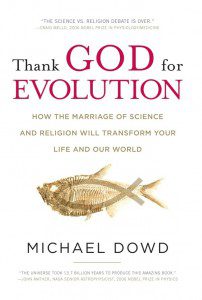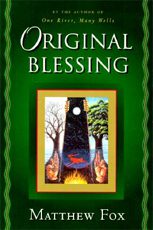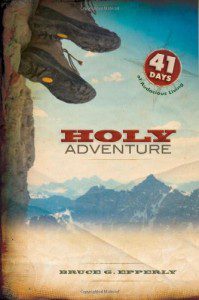Happy Evolution Sunday! Or “Happy Evolution Weekend,” as the event is coming to be known. For the past five years, an increasing number of individuals, churches, and faith communities have recognized the Sunday closest to Charles Darwin’s birthday (February 12) as an annual opportunity to reflect on what religion has to learn from science, in particular how Christianity can embrace the insights of evolution.
In recent months, perhaps the most exciting dialogue between Christianity and evolution has been a series of free online teleseminars on The Advent of Evolutionary Christianity: Conversations at the Leading Edge of Faith that have featured some of the most well-known luminaries of the religion-science dialogue, ranging from scientists to theologians to pastors. The series was hosted by Michael Dowd, author of the bestselling book Thank God for Evolution.
The need for open-minded conversations at the intersection of faith and science is highlighted regularly in the news, which too often features closed-minded atheists yelling at (or being yelled at by) closed-minded Christians. For the purposes of this blog, I will limit myself only to the two most recent examples that come to mind.
First, comedian Stephen Colbert brilliantly satirized political commentator Bill O’Reilly’s claim that the regularity of the ocean’s tides proves the existence of God. When many listeners pointed out that the moon’s gravity causes tidal ebb and flow, O’Reilly dug himself in deeper by saying, “Okay, how did the moon get there?” Of course, scientists have long been able to explain the existence of the moon without recourse to divine intervention. Accordingly, Colbert likened O’Reilly to St. Thomas Aquinas since “Like St. Thomas Aquinas, Bill O’Reilly’s understanding of the world is also from the 13th century.” As people of faith in the 21st century, we can do better, and Evolution Sunday is an explicit invitation to remind both ourselves and our congregations that we shouldn’t have to check our brain at the door of the church.
As a second example, during an recent appearance on “Real Time with Bill Maher,” Representative Jack Kingston (Republican from Georgia) said, “I believe I came from God, not from a monkey…. I don’t believe that a creature crawled out of the sea and became a human being one day.” That position is the sort of anti-intellectual pandering long-ago ridiculed in films such as Inherit the Wind. We deserve better from our elected representatives, and Evolution Sunday is an annual opportunity to demonstrate that religion and science are not mutually exclusive.
O’Reilly’s worldview is borderline pre-Copernican — that is, refusing to accept that the earth is not the center of the universe. But as Carl Sagan helped make known in his books and in his television series Cosmos, we know today that there are more than 100 billion galaxies in the universe, and each of those 100 billion galaxies is comprised of billions of stars. Earth is only a small planet, orbiting one medium-sized star toward the edge of one spiral galaxy that, again, is only one among more than 100 billion other galaxies in the universe.
Representative Kingston’s worldview similarly fails to come to terms with post-Darwinian science. English naturalist Charles Darwin’s 1859 book On the Origin of the Species by Means of Natural Selection recorded his meticulous observations of the natural world and helped demonstrate that humans beings did not originate from a special, one-time act of divine intervention. Instead, humans evolved through the process of natural selection just like every other species. Darwin’s book was monumental, but the challenge for Christians in the 21st-century is not to be in dialogue with Darwin, but to be open to the insights of what science has learned in the 150 years since Darwin’s landmark work. Evolution Sunday is an opportunity to show how much religion and science have to learn from one another.
Moreover, Christians and other people of faith must come to terms with a post-Einsteinian world and its “theory of relativity” as well as of quantum mechanics as popularized by figures like Brian Greene. We do not do ourselves or our congregations any favors by pretending that God spoke the world into existence in Hebrew only 6,000 years ago. Or as Rabbi Harold Kushner has written, “I don’t take the story of the Garden of Eden as a newspaper report … describing the human race as beginning with two full-grown, Hebrew-speaking adults and a talking snake.” Evolution Sunday is a time to stand in open-mouthed awe and wonder at the 13.7 billion year sweep of creation. Roman Catholic theologian John F. Haught has written compellingly about how we can come to have a greater sense of this “deep time”:
Imagine that you have thirty large volumes on your bookshelf. Each tome is 450 pages long, and every page stands for one million years. Let this set of books represent the scientific story of our 13.7-billion-year-old universe. The narrative begins with the Big Bang on page 1 of volume 1, but the first twenty-one books show no obvious signs of life at all. The earth story begins only in volume 21, 4.5 billion years ago, but life doesn’t appear until volume 22, about 3.8 billion years ago. Even then, living organisms do not become particularly interesting, at least in human terms, until almost the end of volume 29. There the famous Cambrian explosion occurs, and the patterns of life suddenly burst out into an unprecedented array of complexity and diversity. Dinosaurs come in around the middle of volume 30 but are wiped out on page 385. Only during the last sixty-five pages of volume 30 does mammalian life begin to flourish. Our hominid ancestors show up several pages from the end of volume 30, but modern humans do not appear until the bottom of the final page. The entire history of human intelligence, ethics, religious aspiration, and scientific discovery takes up only the last few lines on the last page of the last volume.
On Evolution Sunday, such a breathtaking view can remind us to be less arrogant about what we know about God or the tides or the moon — and, instead, following the words of the prophet Micah learn to “walk humbly with God.”
Link to Further Resources: Evolution Weekend 2011
















